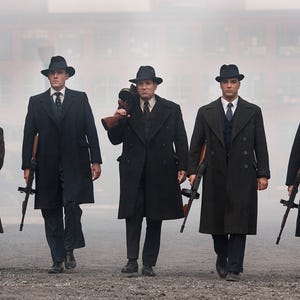Mob movie fans may get that déjà vu feeling when they watch the exploits of real-life gangsters in AMC's The Making of the Mob: New York.
The eight-part documentary-style series (Mondays at 10 p.m. ET/PT) covers a half-century of organized crime history, putting the focus on the Mafia and Murder, Inc., and such notorious criminal heavyweights as
"One of the most famous scenes in Goodfellas, when they're in prison and slicing garlic and making the food in the cell, that was exactly how 'Lucky' Luciano lived in prison," executive producer Stephen David says. "You watch these movies and then you watch this show and ...you can see what was taken from real life."
Liotta says he was intrigued by the real mob stories. "I'm reading (the narration) and every now and then I said, 'Oh, my gosh. They did this? They did that?' I was surprised by some of the stuff they came up with."
David describes the series, which covers more than 50 years of history through 1963, as "a docu-drama, a mix of dramatic scenes, archives, visual effects, talking heads and voiceover." By focusing on the real-life mobsters, depicted by actors, the hope is that viewers will become invested in their stories and the accompanying high stakes.
Interview subjects include former New York City
Mobsters have long been featured in movies and television, and fans aren't the only ones who have picked up on gangster style. Organized crime figures took note of the clothing and attitudes sported by silver-screen icons such as
That connection remains to this day, David says, referring to a Mob story about crime kingpin Costello, who went to a psychiatrist decades before
"I was like, 'Are you kidding me? That's true?' I've watched every Sopranos episode more than one time and I've seen Analyze This," David says.
Liotta has only played a couple of mob roles, but he understands the strong association with a film such as Goodfellas, celebrating its 25th anniversary.
He enjoys having "a movie that has this much staying power. If anything, it builds and grows. The only other movie I have like that is Field of Dreams. That still resonates with people." (In the small-world category, Liotta's Dreams character,
David has a theory as to why some people seem perpetually fascinated with cold-blooded criminals, whether factual or fictional. "I think it's a male fantasy to live that way. There's some sort of freedom," he says, while acknowledging a down side. "Of course, you're probably going to go to jail or get killed, eventually."


